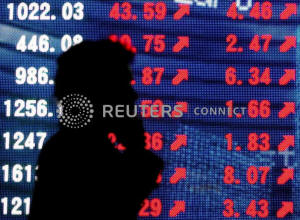Oil and stocks fall as markets still rattled by Fed minutes
 Send a link to a friend
Send a link to a friend
 [August 20, 2020]
By Elizabeth Howcroft [August 20, 2020]
By Elizabeth Howcroft
LONDON (Reuters) - The Federal Reserve's
doubts over the U.S. economic recovery kept markets in the red on
Thursday, even though European stock indexes spent the morning
recovering from initial losses.
Wall Street was knocked from its recent highs on Wednesday after the
Fed's minutes from its July meeting spooked investors by showing that
the swift labour market rebound seen in May and June had likely slowed.
The S&P 500 had reached an all-time high earlier in the week as prices
recovered to their pre-pandemic levels.
The sudden bearishness spilled into Asian markets overnight and
continued in the European session, although shares started to recover as
the morning progressed.
MSCI's broadest index of Asia-Pacific shares outside Japan had its
biggest daily decline in five weeks while the MSCI world equity index,
which tracks shares in 49 countries, was down 0.6% at 1042 GMT.

The pan-European STOXX 600 fell 0.8% and London's FTSE 100 was down
1.14%.
Several Fed policymakers said they may need to ease monetary policy to
help get the economy through the coronavirus pandemic.
"It's easy to forget that we've just experienced one of the largest and
most severe economic shocks on record," said Kaspar Elmgreen, head of
equities at Amundi.
"This story is not over yet, despite what the markets might be
indicating," he said.
"We are navigating a ship here with unusually low forward visibility and
a very wide range of outcomes."
Despite the dovish minutes, U.S. Treasury yields and the dollar rose
with investors focusing on parts of the minutes that showed policymakers
downplaying the need for yield caps and targets.
The dollar index, which measures the currency against a basket of major
peers, was choppy overnight and last at 93.015, up less than 0.1% on the
day .
"The key question for investors is whether the policy responses are
enough to mitigate the economic damage," BH Global, a fund managed by
Brevan Howard, said in an interim report published on Thursday.
"Many businesses face solvency risks that are not addressed by
borrowing; a debt overhang cannot be cured by more borrowing no matter
how cheap it may be," the fund's report added.
"Improved financial conditions are narrowly focused on a handful of
large companies and benefiting stakeholders who need relatively little
economic assistance. The result is that financial assets are expensive
by many standard metrics.
[to top of second column]
|

A man using his mobile phone is silhouetted against a stock
quotation board outside a brokerage firm in Tokyo February 21, 2006.
REUTERS/Toru Hanai

"So long as a V-shaped recovery in risky assets fails to create a
V-shaped recovery in economic activity, this tension is a recipe for
increased volatility," it said, adding that the U.S. presidential
elections in November could be a catalyst for such volatility.
Spot gold rebounded overnight but fell when European markets opened.
It was down 0.2% at 1046 GMT, at $1,926.4615 per ounce.
Oil prices fell, as major producers warned of a risk to demand
recovery.
OPEC and its allies pressed oil nations that are pumping above
output targets to cut more in August to September.
Brent crude was down 49 cents, or 1.1%, at $44.88 a barrel, while
U.S. oil was down 48 cents, or 1.1%, at $42.45 a barrel.
It will take at least two years for the euro zone to fully recover
from its deepest recession on record, according to a Reuters poll of
economists.
Minutes from the European Central Bank's July meeting are due at
1130 GMT.
Germany's benchmark 10-year Bund yield fell for the fifth day in a
row, hitting its lowest in more than a week at -0.499%.
Markets also remained cautious about acrimonious U.S.-China
relations.
China's commerce ministry said the two countries have agreed to hold
trade talks "in the coming days" to evaluate their Phase 1 trade
deal, struck six months ago.
Major central banks will reduce the frequency of seven-day dollar
liquidity operations to once a week from September due to low demand
and reduced financial market tension, the Bank of England said. They
are currently held three times a week and are often met with no
demand.

(Reporting by Elizabeth Howcroft; Editing by Alex Richardson and
Steve Orlofsky)
[© 2020 Thomson Reuters. All rights
reserved.] Copyright 2020 Reuters. All rights reserved. This material may not be published,
broadcast, rewritten or redistributed.
Thompson Reuters is solely responsible for this content. |